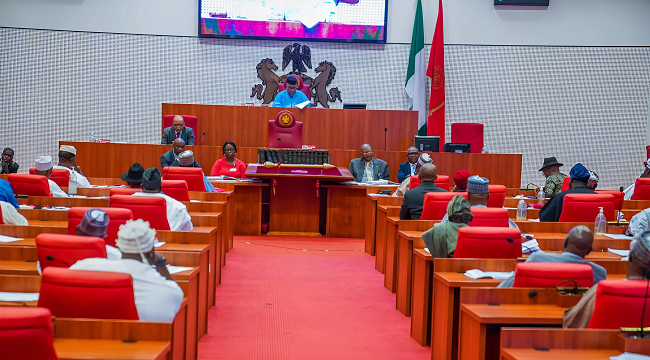The Senate has dismissed the insinuations that the National Assembly has become a mere rubber-stamping institution to the executive arm of government, saying it needed not to be combative to demonstrate its independence.
The Chairman, Senate Committee on Media and Publicity, Senator Yemi Adaramodu, stated this at the weekend in his country home, Ilawe Ekiti, during an interactive session with newsmen.
He said that the upper chamber has done nothing to warrant being labeled a rubber-stamping institution.
The Senator representing Ekiti South senatorial districts said that the mission of the current National Assembly is to be partners in progress with the other arms of government and to make good laws.
“What is the meaning of being a rubber stamp? Does it mean if the Executive organ brings an appropriation bill, because we don’t want to be called a rubber stamp, we should oppose it and throw it away?” he said.
“Does it mean if the Federal Government is proposing a bill on infrastructure because we are afraid of being called a rubber stamp, we should reject it? Or if the executive is increasing the allocation to the Judiciary because we don’t want to be called a rubber stamp, should we throw it away?
“Or if the Federal Government is proposing an increase in the minimum wage, should we reject it so as not to be called a rubber stamp?
“What then is rubber stamping? One thing you must know is that we are not in the senate with boxing gloves in our hands to go and be fighting the executive or other arms of government.
“That is not our calling. Our mission is to be partners in progress by making good laws, the job of the executive is to execute while that of the judiciary is to interpret the laws.
“Our job is not to make laws and to execute them and at the same time to interpret the laws. What laws have we made in the Senate and the House of Representatives that portray us as an institution that is not focused?
“I have not seen any. The tax bills that people are criticizing are not doing so anymore, because many of them did not even see the bills before they started criticizing.
“When the tax bill came, so many people said so many things against it. Seeing the content of what was forwarded by the executive, we opened it up. We told the Federal government to go and do more stakeholder consultations which they did.
“Before we started considering the bills, it was opened up for wider consultation in line with our request. The public hearing was held, and various stakeholders came there including the CSOs to air their own views. It is the aggregate of these opinions that we are now deliberating on and we are now at the 3rd reading of the Tax Bills, does this make us a rubber stamp?”
Speaking on the removal of fuel subsidy and the state of emergency in Rivers State, Adaramodu said: “The removal of fuel subsidy was not the business of the National Assembly.
“The state of emergency in Rivers, I will not really want to make a comment regarding it since it is before a court, but it is very unfortunate that when it comes to such an issue, everyone becomes a lawyer and a judge to interpret it the way it suits them.
“They are even interpreting our standing orders for us, whereas, section 60 of the 1999 constitution provides that we will make rules that will guide our activities internally.
The rules say when the state of emergency request is to be considered, it must be behind closed doors, since it is a security matter. You cannot open it to the public; it has to be debated in a closed session.
“After the close session, if you look at our orders 134, 135, and 136, it stipulates that anything agreed upon after debates at a close session, you cannot bring it to the plenary and be discussing or debating it again.
“But people did not know these rules and standing orders; they started to misconstrue what we were doing. They would be viewing it the way it should be without knowing what the rule that guides us says. We debated it at the close session and we all agree that we are supporting it but with some amendment to what was forwarded to us.”
The Guardian










